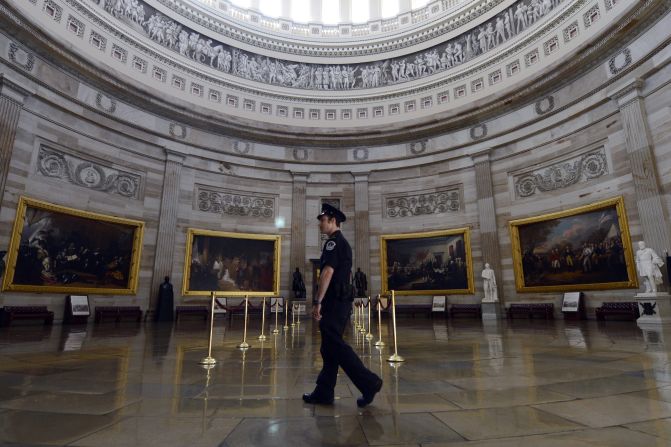Ominous images of anxious adults and children began flashing on streaming services and social media more than a week before Senate Democrats forced a government shutdown over their demands to renew expiring Obamacare insurance subsidies.
“Health care costs will skyrocket,” the advertisements warn, urging Americans to “Tell Congress” to act to continue the tax credits as the video shifts to a view of the Capitol building.
Health insurers, long concerned a spike in insurance premiums triggered by the subsidies’ expiration will drive away millions of customers, is seizing the moment as their best shot at heightening public attention to their message.
The advertising campaign, running across Hulu, Google and Facebook, kicked off on Sept. 20 as congressional Democrats threatened to shut down the government in part over extending the Affordable Care Act’s enhanced premium tax credits, which help lower the cost of health-insurance premiums for roughly 22 million Americans.
Only insurance lobbyists and allied health care advocates have adopted a distinctly bipartisan approach, enlisting at least one Republican strategist and emphasizing GOP-friendly arguments to further their cause.
“We are laser-focused on protecting access to high-quality, affordable health care—and working with policymakers to make it happen,” said David Merrit, senior vice president of external affairs for the Blue Cross Blue Shield Association, which paid for the advertising campaign.
Their bet is that a lobbying offensive can ease the way for an agreement to renew the Obamacare subsidies as either a pathway out of the shutdown or a political priority afterward.
One fact sheet circulated to congressional offices by some in the industry estimates 19 million of the people with coverage that could be impacted live in states that President Donald Trump won in 2024.
“This is big in rural communities, farmers, ranchers, small business owners and small business workers,” said Brendan Buck, communications director for Keep Americans Covered, a coalition that includes health insurance companies as well as the American Medical Association, American Lung Association, and other health care advocates.
“There’s a natural constituency there,” said Buck, a well-known Republican strategist who served former House Speakers Paul Ryan and John Boehner. “I think Republicans see the political risk of allowing this to happen, particularly when the fight for the midterms is so intense.”
Keep Americans Covered has devoted seven-figures to its own ad campaign. The ad intersperses apprehensive commentary from people who could be impacted: “The health care tax credit is the only reason we’ve been able to stay covered,” one man says. “The bills would just break us,” says another.
Health care lobbyists sent congressional staffers and lawmakers new research from the nonpartisan health care research foundation KFF, which estimates consumers will see an average out-of-pocket premium increase of 114% if Congress lets the enhanced premium tax credits expire.
Republican congressional leaders say any negotiation will have to wait until Democrats agree to reopen the government. “This is an extraneous matter right now,” House Speaker Mike Johnson said during a press conference on Wednesday, adding that there is no rush to act since the tax credits don’t expire until Dec. 31.
Still, Republican senators Thom Tillis of North Carolina and Mike Rounds of South Dakota said they are willing to broker a compromise — if Democrats agree to vote for at least a temporary federal funding extension.
“We’re telling the Democrats, ‘You’ve got support on the other side to fix the issues that you have a concern about, but it’s going to take time to negotiate those through,’” Rounds said.
Health insurance companies and their advocates say time is already running out.
Open enrollment for most health insurance plans opens up on Nov. 1. Even if Congress strikes a deal to extend the credits by the end of the year, many people will have already decided not to sign up for their health insurance plans because of higher premiums, said Heather Foster, vice president for marketplace policy at the Association for Community Affiliated Plans, a trade association representing nonprofit health insurance plans.
“Once they open that envelope and it says, ‘Your premiums are going up 200%,’ they don’t open the subsequent envelopes,” Foster said.
Despite the attention the shutdown is focusing on their cause, industry lobbyists aren’t sure whether the political fight will help or hurt, said one health care representative, who agreed to speak on the condition of anonymity. The shutdown has made the issue more partisan than ever, even as some moderate Republicans had previously expressed interest in compromising over an extension.
Ideological opponents are also ramping up their campaign against the Obamacare tax credits.
The subject line for an email from conservative think tank Paragon Health Institute on Wednesday, which was sent to Republican staffers on the Hill, read: “Doing Insurers’ Bidding and Shutting Down the Government.”

